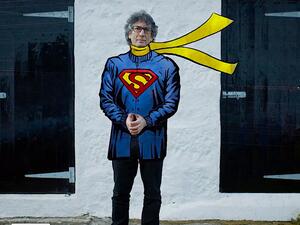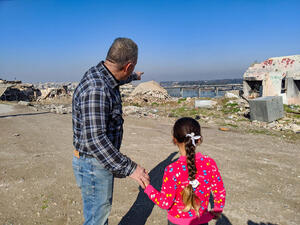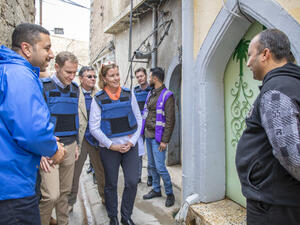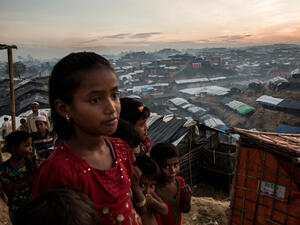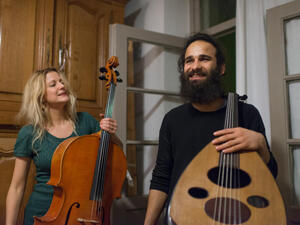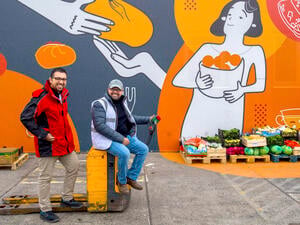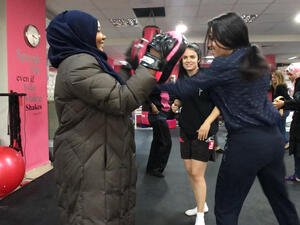From the horror of the Sinjar region to uncertainty in Athens
From the horror of the Sinjar region to uncertainty in Athens

Faraydun holds his son, three-year-old Bader Khan in the small apartment where they are staying in the Greek capital, Athens.
ATHENS, Greece, September 9 (UNHCR) - Athens is one of the great cities of Europe, but to Faraydun and his family it is just a small crowded ground-floor apartment where he feels safe but not happy. There are 20 people in the two-room flat, ethnic Yazidis from Iraq, and they all want to join family elsewhere in Europe.
"I want my children to live in peace and security without fear, in a better world," Faraydun's wife, 28-year-old Nazdar, told UNHCR visitors. She and her two children, a boy and a girl, are still traumatized by their ordeal and the killing, abduction and rape of Yazidis in and around the northern Iraq city of Sinjar.
Faraydun and Nazdar fled their village, Zoraba, when militants started to threaten the whole Sinjar area, home of the Yazidis in Ninewa province for centuries. "I couldn't wait until we were attacked; I was sure it would happen," said Faraydun. "So three days before the big attack, we left for Dohuk [province in neighbouring Iraqi Kurdistan]," added the 32-year-old construction worker.
But despite eventually making their way to Greece after an arduous journey, these vulnerable people still face major obstacles, including a struggle to make ends meet in the Greek capital and the risk of detention and deportation if stopped without identification, which most of the group do not have.
The Yazidis here told UNHCR that one of their group had been sent back to Iraq despite needing treatment for haemodialysis every three days. He reportedly gave up his request for asylum and agreed to repatriate after being told by immigration police that he would be held in detention for a year-and-a-half.
UNHCR has been trying to highlight the plight of the Yazidis through the Greek media and spread awareness about their needs. "The Yazidis are in need of protection and assistance, they should not be detained," stressed Giorgos Tsarbopoulos, head of the UNHCR office in Greece. "They should be treated in the same way as Syrian refugees, who are allowed to spend six months in the country, with the possibility of an extension."
None of the Yazidis in Faraydun's group wanted to return to either Iraq or Syria, where they had faced danger. For Faraydun and his family, it was a tough journey crossing the barren Sinjar mountain range to Dohuk, especially for his elderly in-laws, who remained in Iraqi Kurdistan as Faraydun and Nazdar carried on.
They hoped to reach Germany, where Nazdar has a sister - especially after hearing about the abuses being committed against Yazidis caught in Sinjar. "I'd rather be killed than be kidnapped and sold as a slave or be raped," Nazdar said.
In early August, they joined a group of about 80 people, mostly Yazidis but also including some Syrian Christians, and crossed the Evros River to Greece. Smugglers took those who made it across to Athens in groups of ten. Those waiting for their turn had to survive in the woods without food or shelter.
But despite efforts to ensure they have access to asylum procedures and assistance, all the Yazidis that UNHCR spoke to said they did not want to stay in Greece. They all want to go to other European Union countries where they have close family.
In the meantime, as their meagre financial resources diminish, the group of Yazidis wait for money transfers from relatives. Money transfers from Iraq's Kurdistan are blocked.
The families in the apartment help each other out and they get occasional help from Yazidis who live in Greece. They all worry about the future and family left behind. "I thank God for the safety of our children and I ask him to save my parents," Nazdar said.

